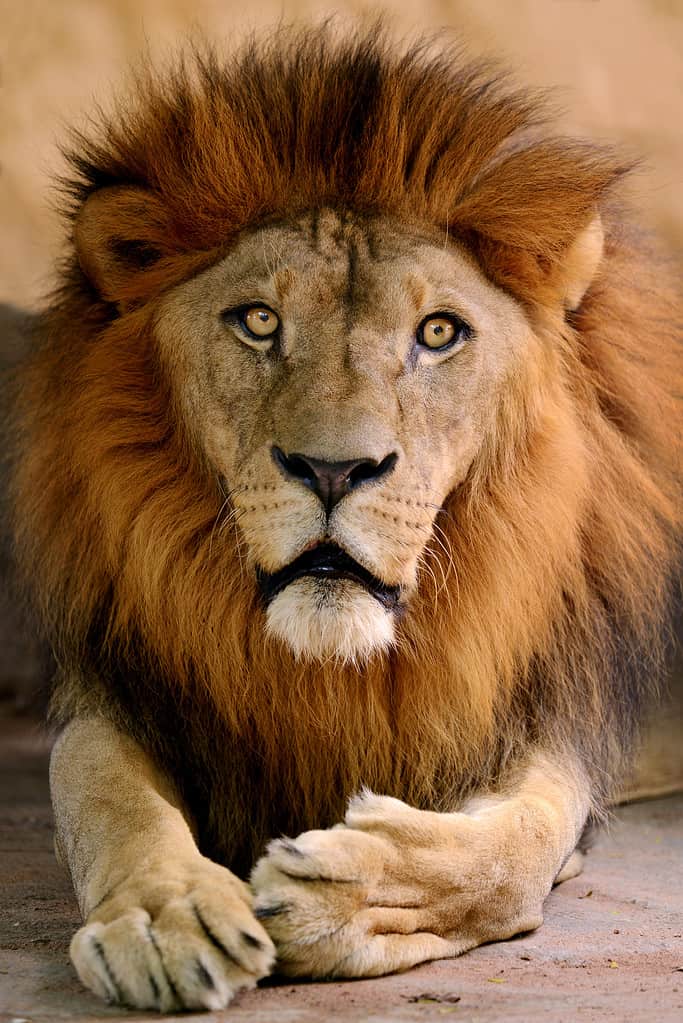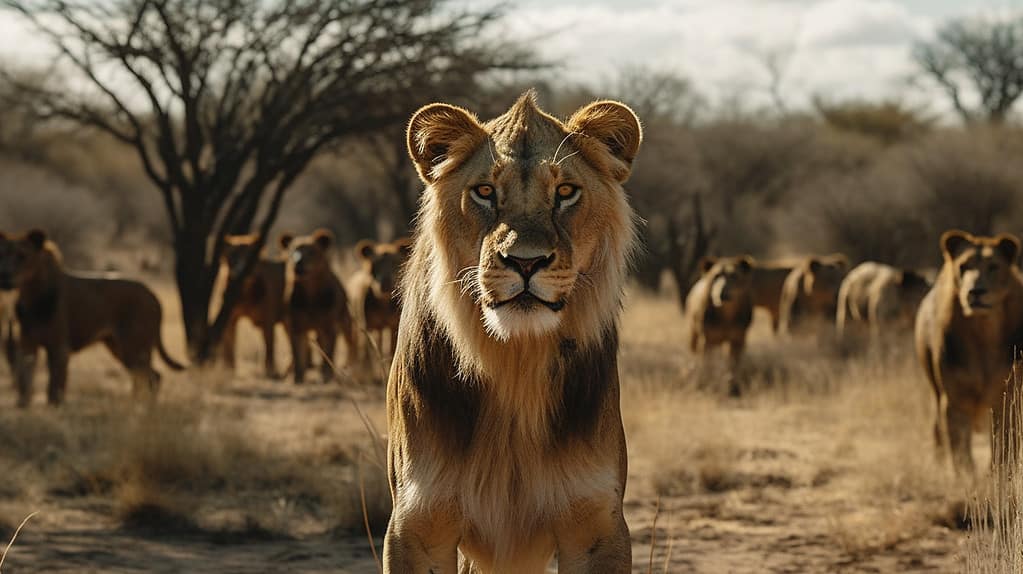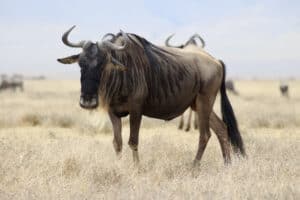What does the lion’s share mean?
The lion’s share is a popular idiom that dates back hundreds of years. It’s a way of communicating how something is divided.
Do you love this phrase and wonder where it came from? Or maybe you’re afraid of misusing the expression and need a quick rundown on the correct context. Either way, we can help!
In this article, we’ll uncover the origins of the expression and the best ways to use it in everyday life. Read on to find out the origin and meaning of the saying, “The Lion’s Share.”
What Does It Mean?

The “lion’s share” stems from a Greek fable.
©dangdumrong/Shutterstock.com
Receiving the lion’s share means receiving the largest portion of something that’s divided.
Here’s an example:
We all had cheese pizza, but I had the lion’s share. This tells us that the pizza was divided, but not equally. You had the most, aka the lion’s share.
The lion’s share can be describing something physical you divide, like pizza, but that’s not all. You could also use the phrase in several other ways.
Here’s another example:
I love all of my pets. But my dog gets the lion’s share of my attention.
In this case, the dog gets most of your attention, which is the lion’s share.
Other Animal Idioms
An idiom is a group of words with a special meaning beyond the words themselves. There are a lot of them in the English language. “Something’s fishy” is an idiom that means something is suspicious. “For the birds” is an idiom that means something isn’t valuable. “Have bigger fish to fry” is an idiom that conveys someone has more important things to do. Can you think of any animal-themed idioms that you’ve heard before?
Origin of the Saying
The lion’s share is an expression that originates from Aesop’s Fable titled “The Lion’s Share.” Aesop is a Greek storyteller best known for his collection of morality tales. It’s believed Aesop wrote these fables during the sixth century BC.
Why did Aesop like using animals in his story so much? Animals quickly create characters that people can picture and understand. Instead of focusing on character building, Aesop could spend more time on the moral.
Might Makes Right
All Aesop’s fables have easy-to-remember morals you can take away from them. In this case, the moral is; “Might makes right.” Let’s briefly review what happens in this story to understand the moral better. You can also read the fable here; it’s super short.
The Lion’s Share: A Quick Summary
A lion, fox, jackal, and wolf go hunting as a team. The wolf is successful in taking down a large male deer. He calls the other animals back so they can all feast.
The lion appoints himself to carve up the deer for this dinner party. After dividing the deer into four equal parts, the lion takes 3 parts of the deer for himself. The big cat explains that he deserves the biggest portion because he’s King lion, the strongest and bravest animal.
There’s one piece of deer left. The lion invites the other animals to speak up if they believe they deserve the last piece of deer. But it’s more of a threat than an invitation.
At the end of Aesop’s fable, the moral reads: “Might makes right.” The takeaway is that it’s never wise to partner with more powerful individuals than yourself. Teaming up with a lion was a mistake for the wolf, fox, or jackal.
Why Is It a Popular Phrase?

Did you know there’s a national lion’s share day? It’s July 22nd. People celebrate by reading Aesop’s fables and throwing animal-themed parties.
Why is the saying “lions share” popular enough to have its own day? For starters, this expression has been around for a long time. The timeline begins with Aesop’s fables, written in the 6th century BC.
Fast forwarding to the 1660s, a French author began using the phrase in French. Jean de la Fontaine was the first to write a French translation.
Moving into the 18th century, the expression became an English idiom. During the 18th century, the lion’s share is widely used in English writing. It even appears in an English dictionary for the first time. By 1945, the phrase popped up in a popular story titled Animal Farm.
Examples of Everyday Use
Let’s go over a few more examples of everyday use for the phrase.
- The lion’s share of my paycheck goes to animal books.
- Let me pay for dinner; I had the lion’s share of the food.
- There are feral hogs nationwide, but Texas has the lion’s share.
- Out of all the species in the world, insects make up the lion’s share.
As you can see, there are many different ways to use this expression. You can be as creative as you want when you understand an idiom. Now, let’s see a few ways NOT to use this expression.
Common Misinterpretations of the Saying
The lion’s share is an idiomatic expression. It’s a group of words communicating when someone receives the bigger share of something. The idiom originates from Aesop’s fable, but it has nothing to do with the moral “Might is right”.
The fable’s moral is that the bigger and stronger individual will always have the last word. Therefore, partnering with those more powerful than yourself is unwise, especially when they’re lions. Since the expression conveys the amount someone receives and the fable delivers a life lesson, confusing the two messages is easy.
The lion in the fable is portrayed as greedy, powerful, and unfair. As a result, sometimes people think that receiving the lion’s share is a bad thing. But it can be a very good thing. The expression has nothing to do with anyone being powerful or greedy, like the lion in Aesop’s fable.
More Popular Sayings With the Word Lion
Lions provide powerful imagery. They symbolize strength, power, royalty, and courage. Phrases with this big cat’s name in them are worth having in your vocabulary. Here are a few of our favorites:
- Lionhearted
- Put your head in the lion’s mouth
- Fight like a lion
- Throw to the lions
- As bold as a lion
- Brave as a lion
“Lionhearted”, this individual is passionate and fierce. They aren’t one to take no for an answer, and they don’t back away from a challenge.
“Put your head in the lion’s mouth”, means purposefully putting yourself in a potentially compromising or dangerous situation. It’s similar to putting your neck on the line or sticking one’s neck out.
“Throw to the lions” means putting someone in harm’s way. This idiom isn’t always serious and can be used playfully to describe an unpleasant situation. For instance, let’s say you had a friend over for a family dinner, and they got stuck talking to a grumpy grandpa. You could say they were “thrown to the lions”.
Final Thoughts on “The Lion’s Share”

A “lion’s share” is associated with having more or getting more than others.
©Dmussman/Shutterstock.com
Now you know the origins of the idiomatic expression the lion’s share and what it means. We also covered what this expression doesn’t mean. The lion’s share is an old expression with a simple meaning.
The expression dates back to the mid-6th century BC. Aesop, a famous Greek storyteller, wrote the short fable “The Lion’s Share”, which became wildly popular. The story is a fast read and provides an intriguing moral; “Might is right”.
What does the moral of the fable mean? The powerful party wins. So use wisdom when choosing who you do business with. The fox, jackal, and wolf were unwise to join a hunting team with the lion. When the wolf makes a kill, the big cat asserts his dominance, laying claim to most of the meat. The parts claimed by the feline are “the lion’s share”.
The phrase comes from Aesop’s popular fable, but the moral of the fable doesn’t relate to the meaning of the phrase or idiom. Today, the saying means receiving the largest portion or share of something. It’s also a creative way of describing how something played out.
The photo featured at the top of this post is © Tony Campbell/Shutterstock.com
Thank you for reading! Have some feedback for us? Contact the AZ Animals editorial team.







